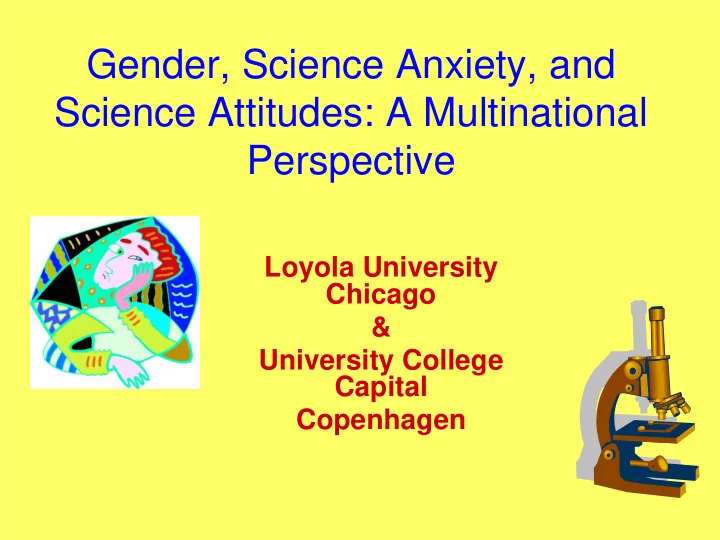

Gender, Science Anxiety, and Science Attitudes: A Multinational Perspective Loyola University Chicago & University College Capital Copenhagen
Science Anxiety A debilitating interaction of emotion--fear, with cognition-- science learning.
Science Anxiety (SA) Questionnaire • 44 questions • 22 science related questions • 22 non-science related questions • students were asked how much they were frightened in performing the activities described in the questionnaire. • Self reported anxiety: 1 2 3 4 5 not at all little fair amount much very much
Science Anxiety Questionnaire Sample Items • Asking a question in a science class. • Asking a question in an English Literature class. • Focusing the lens on your camera. • Focusing a microscope. • Memorizing a chart of historical dates. • Memorizing the names of elements in the periodic table.
MULTIPLE REGRESSION ANALYSIS Best predictors of science anxiety are non-science anxiety, gender, course of study. science anxiety gender course of study non-science anxiety
ACUTE ANXIETY: ORIGINAL STUDY Percent of Science-Anxious Students of Generally-Anxious Samples US & DENMARK Percent SA/GA 100 80 % of cohort 60 40 20 0 1 2 3 4 USF USM DKF DKM SA: "Science-Anxious"--students answ ered any of the 2 2 science questions "m uch" or "very m uch". GA: "Generally-Anxious"--students answ ered any of the 4 4 questions "m uch" or "very m uch".
Changes in Acute Science Anxiety in a Semester of Physics (US) % SA/ GA: Positive values are reductions in science anxiety 20 15 10 5 0 -5 -10 L. C. C. C. Un. Males Arts Phys. Phys. Phys. Phy. A C E Females
Acute Science Anxiety in Science and Non-science Students (US) % SA/ GA students by gender and course of study 100 80 60 % 40 % 20 0 HUM NUR SCI OTHER UND BUS EDU MAT SSC Course of study %FEM SA %MALE SA
DANISH GYMNASIUM REFORM Physics required for all. -Pre-reform students of both genders were more science-anxious than post-reform students. -No gender differences in science anxiety among pre- or post-reform students. -The level of science anxiety among both pre- and post-reform students was higher than in the 1990’s studies.
Further Observations US students’ results are the same as Danish students’: no gender differences in SA/GA. SA/GA masks separate SA and GA values, which appear to exhibit some gender differences and changes over time. Further study needed.
Attitudes Toward Science
“Attitudes Towards Science” Questionnaire Science is a “level playing-field” in which men and women have equal status and opportunity. (“Traditional” view) Science reflects the social and political values, philosophical assumptions, and intellectual norms of the culture in which it is practiced. (“Moderate constructivist” view.) Science is by its nature hostile to women. (“Radical constructivist” view)
QUESTIONNAIRES--LOYOLA ATTITUDES TOWARD SCIENCE: Women scored significantly higher than men on “Inherent Bias of Science Against Women.” Men scored significantly higher than women on “Negativity of Science Toward the Individual.”
ATTITUDES AND ANXIETY REGRESSION ANALYSIS (A) For males , Subjective construction of knowledge science anxiety. Science opposed to humanity science anxiety. (B) For females , Science opposed to humanity , not just women science anxiety .
INTERVIEWS:SELECTED QUESTIONS What causes of anxiety in science can you identify? Why do you think gender differences exist in subject choices? Some people have suggested that science is inherently hostile and biased toward women. How do you feel about this particular viewpoint? Some people have suggested that there are no facts and that science is simply constructed from the personal opinions of scientists . How do you feel about this particular viewpoint?
SUMMARY, IMPLICATIONS, AND RECOMMENDATIONS None of the responses associated with gender. Course of study in each national group sometimes associated with responses. Students were almost all “moderate constructivists,” acknowledging biases and hostilities in scientific practice but not in the nature of science. The starkest distinction was between the two all-female US groups: education students and science teachers, who disagreed on the possible validity of creationism/intelligent design. No obvious connection between discussions of science anxiety and science attitudes.
Analyzing attitudes/anxiety/gender/nationality questionnaire data New study: written interviews of Danish gymnasium and university teachers and successor groups of CPS teachers who are students in the Teaching Scholars’ Program.
Recommend
More recommend